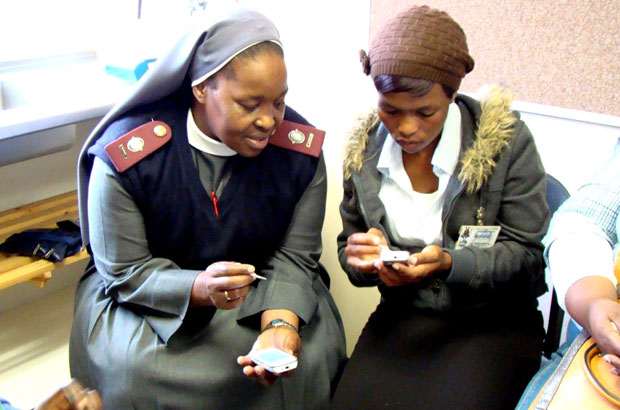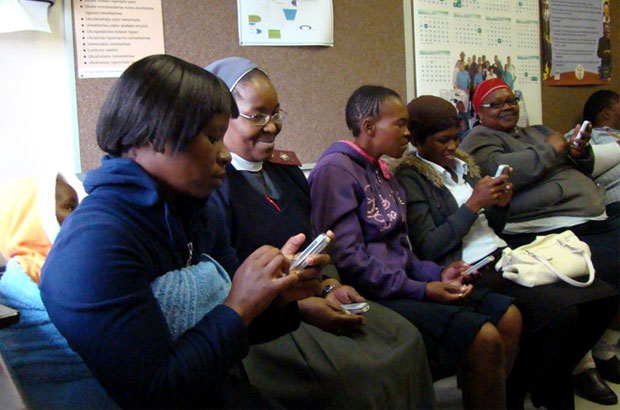Over the past decade, the mobile phone has changed the way I live my life – from connecting me to friends, to being able to access a world of information while on the move. In August 2014, South Africa’s Minister of Health launched MomConnect – the country’s first national mobile health (mHealth) service which opens up the versatile benefits of mobile phones. It seeks to help women and girls have the healthiest possible pregnancy, registering them on a national database and sending targeted health advice during their pregnancy, as well as for the first year of their child’s life.
It marks a huge step forward for mHealth supporters in the African region and for women in South Africa, as we tackle Millennium Development Goals (MDGs) 4 and 5 – to reduce child mortality and improve maternal health – with new technology and innovation.
The project is part of the SARRAH programme, a 5 year health systems strengthening initiative supported by the Department for International Development (DFID) and managed by HLSP, an international health agency. The programme provides technical support to South Africa’s Ministry and National Department of Health and their partners.

Seed funding
When the MomConnect initiative began in 2013, the GSM Association (GSMA), with catalytic funding from DFID, played a crucial role on the task team that was selected to realise this project. As part of their work, they commissioned research to understand the needs of pregnant women and mothers.
Results showed that, with 94-96% having access, the mobile phone was the most effective channel for communicating. Marking a significant move away from the use of television and radio for such initiatives, it matched up with my own experience in South Africa of never being more than a short walk away from someone selling airtime.
Funding from SARRAH also supported Jembi Health Systems who developed rules to keep different MomConnect systems talking to each other. Additionally, Johns Hopkins University created a monitoring and evaluation framework so that the right information can be collected and analysed.
As MomConnect evolves, we hope that it will positively impact MDGs 4 and 5, as we enter the final ‘500 Days of Action’.
Innovation
DFID funding has also enabled HISP, the Health Information Systems Programme, and Cell-Life, a software development non-governmental organisation based in Cape Town, to continue contributing to the mHealth sphere in South Africa. This work has included:
- Developing the mobile technology and training health facility staff to capture data using mobile phones from HIV counselling and testing (HTC) and anti-retroviral treatment (ART) expansion programmes;
- Training community health workers (CHWs) to use mobile phones to collect household data in rural areas;
- Developing an app for pharmacists in public clinics to manage their drug supplies, freeing up more of their day to dispense drugs and to reduce stock-outs in public clinics;
- Supporting health managers to utilise a system where patients rate their public health facilities by mobile phone; and
- Creating a secure messaging system that relies on voice, rather than text, to cater for the large numbers of illiterate people who own mobile phones in sub-Saharan Africa.

For me, these innovations all contribute in some way towards strengthening the health system and towards achieving MDGs 4 and 5. By reducing stock-outs of ART drugs, we are also addressing MDG 6, which looks at tackling infectious diseases. And when I attended a training session in KwaZulu-Natal for CHWs (who were all female), I also saw first-hand that providing mobile phones to this important group of women allows them to be more independent, contributing to MDG 3 – to promote gender equality and empower women – highlighting that the phone was far more than just an mHealth tool.
Sustainability
One notable success of these initiatives is that they are expected to be sustained without further support from DFID. For MomConnect, plans are already in place for the South African government to take full financial responsibility from USAID, who are funding the implementation and roll-out of the programme for the next 2 years. To assist with this, the SARRAH programme is supporting the development of financial models that can assist NDOH to reduce costs and leverage the necessary funds. It’s hoped that this could then inform the Pan-African mHealth Initiative, which supports the scale up of mHealth and mNutrition initiatives to address MDGs 4, 5 and 6, spanning other sub-Saharan countries.
Additionally, financial support for the other initiatives has been taken over by government departments, such as the training of CHWs, or by universities, who are piloting some of the software in formal research studies.
The future
The British public can be proud of DFID’s support to the South African health system and their belief in innovation and technology. However, plenty of work still remains.
As we embark on the post-2015 agenda, we must ensure certain communities don’t get left behind. Between 4-6% of pregnant women in South Africa still do not have access to mobile phones. We also need to collaborate more with those who can ensure access to renewable and sustainable power sources, on which modern technology depends, is provided to all.
While some people may ask whether mHealth can add value, I believe the real question should be on how it can add value. We must not view mHealth as a singular intervention in its own right, but rather to view the mobile phone more broadly as a tool or platform from which new and existing health initiatives can be delivered better, cheaper, faster and at scale.
We are already starting to see education, finance and employment services increasingly channelled through mobile phones and the health sector must keep up. I hope, in South Africa at least, that MomConnect signals the first of many national health initiatives that take advantage of mobile phone technology to improve lives on the ground.
———————————————————————————————
Please note, this is a guest blog. Views expressed here do not necessarily represent the views of DFID or have the support of the British government.
Keep in touch. Sign up for email updates from this blog.

1 comment
Comment by Simon Harger posted on
An excellent review of some sterling work from Dr Huszar. The British public should be proud of the innovative initiatives they are funding.